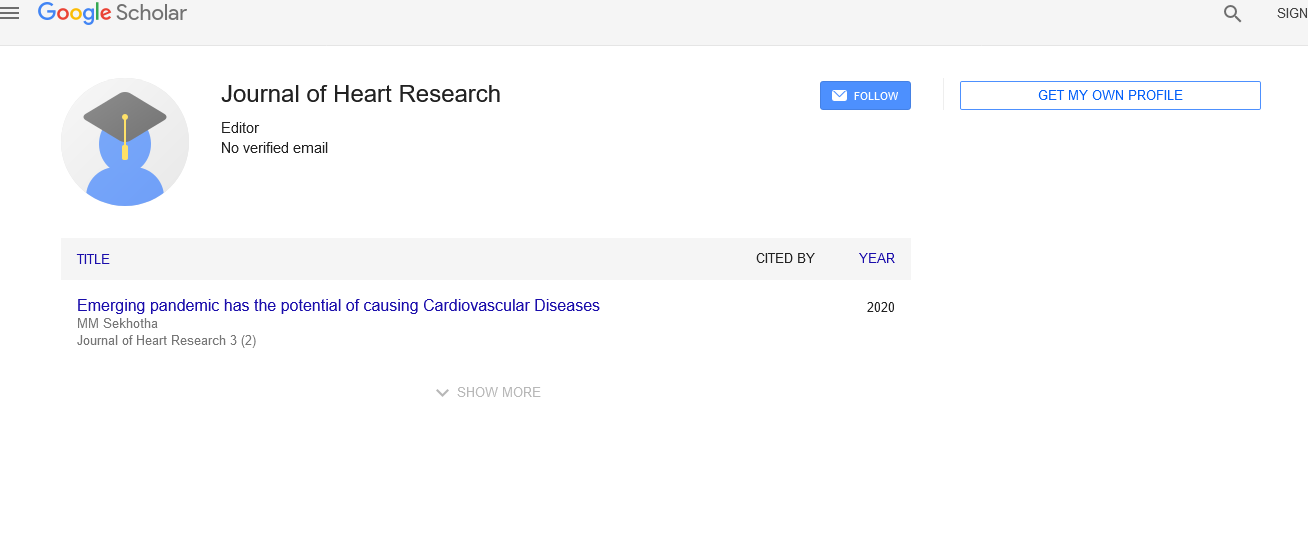The gut micro-biome and systolic blood pressure: Unravelling the correlation
Received: 12-Oct-2023, Manuscript No. PULJHR-23-6796; Editor assigned: 14-Oct-2023, Pre QC No. PULJHR-23-6796 (PQ); Reviewed: 28-Oct-2023 QC No. PULJHR-23-6796; Revised: 10-Jan-2024, Manuscript No. PULJHR-23-6796 (R); Published: 17-Jan-2024
Citation: Hessy E. The gut micro-biome and systolic blood pressure: Unravelling the correlation. J Heart Res. 2024;7(1):1-2.
This open-access article is distributed under the terms of the Creative Commons Attribution Non-Commercial License (CC BY-NC) (http://creativecommons.org/licenses/by-nc/4.0/), which permits reuse, distribution and reproduction of the article, provided that the original work is properly cited and the reuse is restricted to noncommercial purposes. For commercial reuse, contact reprints@pulsus.com
Abstract
The human gut micro-biome, a complex ecosystem of trillions of microorganisms residing in the digestive tract, has garnered increasing attention for its potential impact on various aspects of health. Recent research has unveiled an intriguing correlation between the composition of the gut micro-biome and Systolic Blood Pressure (SBP), a critical marker of cardiovascular health. This article explores the emerging evidence behind the relationship between gut microbes and SBP and its implications for cardiovascular health.
Keywords
Gut microbiome; Cardiovascular health; Systolic blood pressureIntroduction
The gut micro-biome and cardiovascular health: Cardiovascular diseases, including hypertension, are a leading cause of morbidity and mortality worldwide. Hypertension, characterized by elevated SBP, is a significant risk factor for heart disease, stroke, and other cardiovascular complications. While traditional risk factors such as diet, physical activity, and genetics are well-established, the role of the gut micro-biome in hypertension has recently come into focus.
The correlation between gut microbes and SBP: Several studies have identified a correlation between the composition of gut microbes and SBP. Key findings include:
• Microbial diversity: Reduced microbial diversity in the gut has been associated with higher SBP levels. A less diverse micro-biome may be less effective in promoting overall health, including cardiovascular health.
• Specific microbial species: Certain bacterial species, such as those belonging to the genera Prevotella and Faecalibacterium, have been inversely correlated with SBP. These bacteria are associated with anti inflammatory effects and may contribute to blood pressure regulation.
• Metabolites: Gut microbes produce metabolites that can influence blood pressure regulation. Short-Chain Fatty Acids (SCFAs), for example, have been linked to lower SBP due to their vasodilatory and anti-inflammatory properties.
Implications and future directions: Understanding the relationship between the gut micro-biome and SBP has several implications:
• Personalized interventions: Tailored interventions to modulate the gut micro-biome, such as dietary changes, probiotics, and prebiotics, may have potential as novel strategies for hypertension management.
• Early detection: Gut microbial markers could serve as early indicators of hypertension risk, allowing for proactive prevention efforts.
• Precision medicine: Personalized medicine approaches that consider an individual's gut micro-biome profile may become a reality in hypertension management.
Description
However, it is essential to acknowledge that this field of research is still evolving, and causality remains a topic of ongoing investigation. The gut micro-biome is influenced by numerous factors, including diet, lifestyle, and genetics, making it challenging to establish direct cause-and-effect relationships.
The human gut microbiome, a complex ecosystem of trillions of microorganisms residing in the digestive tract, has garnered increasing attention for its potential impact on various aspects of health. Recent research has unveiled an intriguing correlation between the composition of the gut microbiome and Systolic Blood Pressure (SBP), a critical marker of cardiovascular health. This article explores the emerging evidence behind the relationship between gut microbes and SBP and its implications for cardiovascular health.
Cardiovascular diseases, including hypertension, are a leading cause of morbidity and mortality worldwide. Hypertension, characterized by elevated SBP, is a significant risk factor for heart disease, stroke, and other cardiovascular complications. While traditional risk factors such as diet, physical activity, and genetics are well-established, the role of the gut microbiome in hypertension has recently come into focus, suggesting that our microbial inhabitants could play a crucial role in cardiovascular health.
Several studies have identified a correlation between the composition of gut microbes and SBP. For instance, reduced microbial diversity in the gut has been associated with higher SBP levels. A less diverse microbiome may be less effective in promoting overall health, including cardiovascular health. This observation raises the possibility that fostering a diverse gut environment could be beneficial in managing blood pressure. Furthermore, certain bacterial species, such as those belonging to the genera Prevotella and Faecalibacterium, have been inversely correlated with SBP. These bacteria are known for their anti-inflammatory effects and may contribute to blood pressure regulation, highlighting the potential for specific microbial strains to influence cardiovascular outcomes.
Gut microbes produce various metabolites that can impact blood pressure regulation, with Short-Chain Fatty Acids (SCFAs) being a prime example. SCFAs have been linked to lower SBP due to their vasodilatory and anti inflammatory properties. This connection underscores the importance of dietary fibers, which can promote the growth of beneficial gut bacteria that, in turn, produce SCFAs. Hence, the foods we consume not only affect our gut health but may also have direct implications for our blood pressure levels.
Understanding the relationship between the gut microbiome and SBP has several implications for healthcare. Tailored interventions to modulate the gut microbiome such as dietary changes, probiotics, and prebiotics may emerge as novel strategies for hypertension management. By emphasizing the role of diet in shaping our microbiome, healthcare providers could offer personalized dietary recommendations aimed at reducing blood pressure. Additionally, gut microbial markers could serve as early indicators of hypertension risk, allowing for proactive prevention efforts. For instance, routine assessments of gut microbiome composition could lead to earlier interventions in at-risk populations.
The potential for precision medicine is also significant. Personalized medicine approaches that consider an individual's gut microbiome profile may become a reality in hypertension management, allowing for more targeted therapies that take into account a patient’s unique microbial landscape. However, it is essential to acknowledge that this field of research is still evolving, and causality remains a topic of ongoing investigation. The gut microbiome is influenced by numerous factors, including diet, lifestyle, and genetics, making it challenging to establish direct cause and effect relationships.
In summary, the correlation between the gut microbiome and systolic blood pressure represents a promising avenue of research in cardiovascular health. While further studies are needed to elucidate the precise mechanisms and causal relationships, this emerging field offers exciting prospects for innovative approaches to hypertension management and prevention. By recognizing the role of our gut microbes in cardiovascular health, we may unlock new strategies to combat hypertension and reduce the burden of cardiovascular diseases worldwide. The journey towards understanding this intricate relationship could ultimately pave the way for groundbreaking interventions that integrate gut health into cardiovascular care.
Conclusion
The correlation between the gut micro-biome and systolic blood pressure represents a promising avenue of research in cardiovascular health. While further studies are needed to elucidate the precise mechanisms and causal relationships, this emerging field offers exciting prospects for innovative approaches to hypertension management and prevention. By recognizing the role of our gut microbes in cardiovascular health, we may unlock new strategies to combat hypertension and reduce the burden of cardiovascular diseases worldwide.





